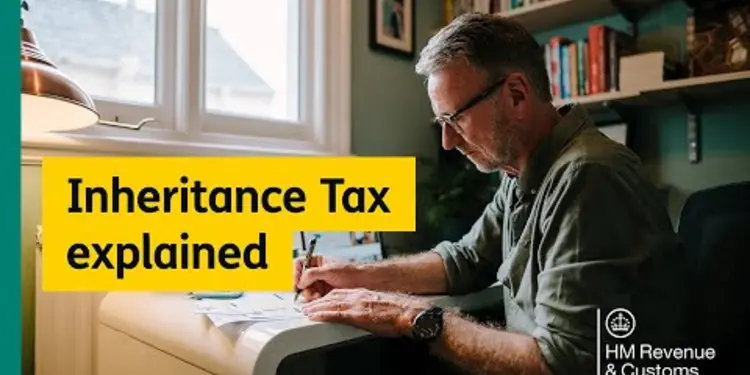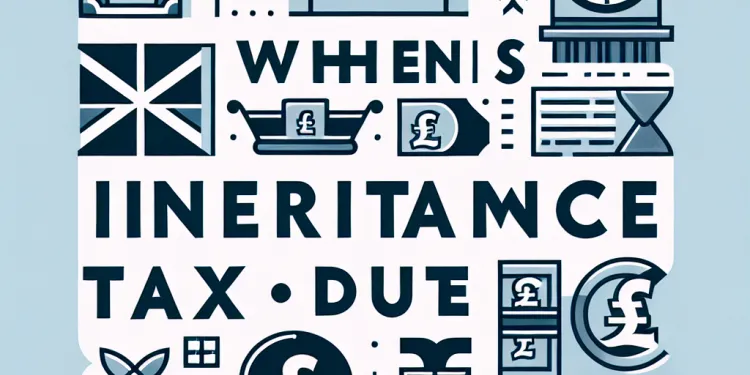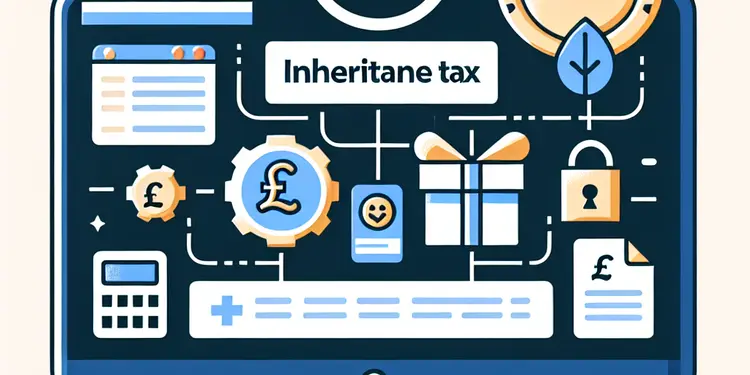
Find Help
More Items From Ergsy search
-

What is the seven-year rule relating to inheritance tax?
Relevance: 100%
-

What is the '7-year rule' in Inheritance Tax?
Relevance: 58%
-

What is inheritance tax in the UK?
Relevance: 58%
-

What is inheritance tax?
Relevance: 53%
-

Does the value of gifts affect Inheritance Tax?
Relevance: 53%
-

Are there deductions available for inheritance tax?
Relevance: 48%
-

What is inheritance tax in the UK?
Relevance: 46%
-

Can gifting reduce future inheritance tax liabilities?
Relevance: 46%
-

What is Inheritance Tax?
Relevance: 45%
-

Are there any other reliefs available from inheritance tax?
Relevance: 45%
-

Do I pay Inheritance Tax on a property I inherit?
Relevance: 44%
-

Are there tax-free thresholds for inheritance tax?
Relevance: 44%
-

Do spouses have to pay inheritance tax?
Relevance: 44%
-

When is inheritance tax due?
Relevance: 44%
-

How is inheritance tax calculated?
Relevance: 44%
-

Is it possible to reduce the Inheritance Tax bill?
Relevance: 43%
-

What is Inheritance Tax?
Relevance: 43%
-

Are there any exemptions from inheritance tax?
Relevance: 43%
-

When is inheritance tax due to be paid?
Relevance: 43%
-

Is there a difference between inheritance tax and estate tax?
Relevance: 42%
-

Can Inheritance Tax be claimed back?
Relevance: 42%
-

How does inheritance tax affect life insurance policies?
Relevance: 42%
-

Which countries impose inheritance tax?
Relevance: 42%
-

Does inheritance tax vary by state or region?
Relevance: 42%
-

When do I need to pay Inheritance Tax?
Relevance: 42%
-

How is the Inheritance Tax bill calculated?
Relevance: 42%
-

Who pays the inheritance tax?
Relevance: 41%
-

How does inheritance tax affect non-UK domiciled individuals?
Relevance: 41%
-

Can inheritance tax be deferred?
Relevance: 41%
-

What assets are subject to inheritance tax?
Relevance: 41%
-

What happens if inheritance tax is not paid?
Relevance: 41%
-

What is the process for paying inheritance tax?
Relevance: 41%
-

Is there any inheritance tax exemption for spouses or civil partners?
Relevance: 40%
-

Can an inheritance tax bill be challenged or appealed?
Relevance: 40%
-

Who is responsible for paying Inheritance Tax?
Relevance: 40%
-

How can I plan efficiently to mitigate inheritance tax?
Relevance: 39%
-

Do unpaid tax debts affect Inheritance Tax calculations?
Relevance: 39%
-

Do all beneficiaries pay the same inheritance tax rate?
Relevance: 39%
-

Are there professional advisors for inheritance tax planning?
Relevance: 39%
-

Can Inheritance Tax be paid in installments?
Relevance: 39%
Understanding the Seven-Year Rule in Inheritance Tax
Inheritance Tax (IHT) is a tax on the estate of someone who has passed away, including all property, possessions, and money. For many in the UK, minimizing the amount of Inheritance Tax due is an important financial planning goal. One key aspect of this planning involves understanding the seven-year rule.
What is the Seven-Year Rule?
The seven-year rule is a component of Inheritance Tax planning that primarily concerns the transfer of assets. According to this rule, if you give away assets and survive for at least seven years after the gift is made, those assets may not be counted as part of your estate for Inheritance Tax purposes. Consequently, they may be exempt from taxation. This rule effectively provides a way for individuals to reduce the taxable portion of their estate by making gifts to beneficiaries well before their death.
How the Seven-Year Rule Works
When an individual makes a gift, such as transferring cash, property, or valuable items, it is initially treated as a Potentially Exempt Transfer (PET). If the person survives for more than seven years after making the gift, it becomes fully exempt from Inheritance Tax. However, if the individual passes away within seven years, the gift may still be liable for tax, although taper relief could apply.
Understanding Taper Relief
Taper relief reduces the amount of Inheritance Tax payable on gifts made between three and seven years before the donor’s death. The relief is applied as follows:
- If the gift was made less than three years before death: 40% (full IHT)
- 3 to 4 years before death: 32%
- 4 to 5 years before death: 24%
- 5 to 6 years before death: 16%
- 6 to 7 years before death: 8%
- 7 or more years before death: 0% (fully exempt)
Exceptions to the Rule
There are exceptions and rules to consider concerning the seven-year rule. For instance, gifts must be absolute, meaning the giver cannot continue to benefit from them. Gifting property but remaining a resident without paying an appropriate market rent might disqualify the gift from being exempt. Certain gifts, like those part of a will or gifts that exceed certain annual allowances, may not qualify for exemptions.
Strategic Financial Planning
Understanding the seven-year rule is crucial for strategic financial planning and effectively minimizing Inheritance Tax liabilities. By planning and making use of lifetime gifts, individuals can significantly reduce the IHT burden on their estate, thus maximizing the inheritance for beneficiaries. Consulting with a financial advisor or tax professional is often beneficial to navigate the complexities of these regulations.
Understanding the Seven-Year Rule in Inheritance Tax
Inheritance Tax is a tax on what someone leaves behind when they die. This includes their home, belongings, and money. Many people in the UK try to lessen the amount of this tax. One important part of planning is knowing about the seven-year rule.
What is the Seven-Year Rule?
The seven-year rule is about giving gifts of money or things to others. If you give something away and live for at least seven more years, that gift might not be taxed when you die. This means it might not count towards Inheritance Tax. It's a way to reduce the taxes on what you leave behind by giving gifts while you are alive.
How the Seven-Year Rule Works
If you give a gift, like money or a house, it first counts as a Potentially Exempt Transfer (PET). If you live more than seven years after giving it, the gift becomes tax-free. But if you die within seven years, the gift might still be taxed. Some relief may apply to lower the tax.
Understanding Taper Relief
Taper relief can lower the tax on gifts given between three and seven years before someone dies. Here's how it works:
- If the gift was given less than three years before death: 40% tax
- 3 to 4 years before death: 32% tax
- 4 to 5 years before death: 24% tax
- 5 to 6 years before death: 16% tax
- 6 to 7 years before death: 8% tax
- 7 or more years before death: 0% tax (no tax owed)
Exceptions to the Rule
There are some rules about gifts. For example, you can't keep using what you've given away without paying fair rent if it's a property. Some gifts, like those in a will or very large gifts, might not be tax-free.
Strategic Financial Planning
Knowing about the seven-year rule helps with planning your finances and keeping taxes lower. By giving gifts while you're alive, you can reduce the tax on what you leave behind. Talking to a financial advisor or tax expert can help you understand these rules better.
Frequently Asked Questions
What is the seven-year rule relating to inheritance tax?
The seven-year rule refers to the UK inheritance tax rule that gifts made more than seven years before the death of the giver are exempt from inheritance tax.
How does the seven-year rule affect inheritance tax?
If a person gifts assets and survives for seven years after making the gift, the gift is generally not subject to inheritance tax.
What happens to gifts made less than seven years before death?
Gifts made less than seven years before death may be subject to inheritance tax, with tax applying on a sliding scale known as 'taper relief'.
Does the seven-year rule apply to all types of gifts?
The rule mainly applies to PETs (Potentially Exempt Transfers), but gifts into some types of trusts may have different rules.
What is taper relief?
Taper relief reduces the amount of inheritance tax payable on gifts made between three and seven years before death.
How much is the inheritance tax in the UK?
Inheritance tax is normally charged at 40% on estates over the nil rate band, which is £325,000 as of the latest update.
Is there an exemption threshold for gifts made within seven years of death?
Yes, everyone has an annual gift allowance of £3,000 per tax year that does not count towards the seven-year rule.
Can taper relief eliminate inheritance tax completely on a gift?
No, taper relief can reduce the amount of tax payable but does not eliminate it entirely. It also only applies if the total gifts exceed the nil rate band.
Does the seven-year rule apply to all countries?
No, the seven-year rule specifically applies to UK inheritance tax. Other countries have different rules and laws.
What are Potentially Exempt Transfers?
Potentially Exempt Transfers (PETs) are gifts that are exempt from inheritance tax if the donor survives seven years after making the gift.
What types of gifts are immediately exempt from inheritance tax?
Certain gifts, such as those between spouses or civil partners and those under the annual gift allowance, are immediately exempt from inheritance tax.
How is the seven-year period calculated for the rule?
The seven-year period is calculated from the date the gift is made to the date of the donor’s death.
What is the nil rate band?
The nil rate band is the threshold of an estate value that is not subject to inheritance tax, which is £325,000 as of 2023.
Can the seven-year rule affect the inheritance tax on my estate?
Yes, gifts made within seven years of death can reduce the nil rate band available for the rest of the estate, potentially increasing tax on the estate.
Is interest payable on inheritance tax from gifts?
Interest may be payable on unpaid inheritance tax if it is not settled by the due date, including tax from gifts within seven years of death.
Are there exceptions to the seven-year rule?
Yes, gifts for maintenance of family dependants and some charitable gifts may not be subject to the seven-year rule.
Do I need to report gifts made under the seven-year rule?
Yes, significant gifts should be documented and reported, especially if made within seven years prior to death.
What documentation is needed for the seven-year rule?
Keeping records of when gifts were given, the value of the gifts, and the recipient is important for inheritance tax purposes.
Can changes in the nil rate band affect past gifts?
Changes in the nil rate band could affect how much inheritance tax is due on gifts made within seven years before death.
Do gifts to trusts fall under the seven-year rule?
Gifts to some trusts may not be considered PETs and could have different tax implications, often requiring immediate tax considerations.
What is the seven-year rule for inheritance tax?
When someone gives you money or things, it is called a "gift". If they pass away within 7 years of giving you the gift, you might have to pay a tax called inheritance tax.
If they live more than 7 years after giving you the gift, you do not have to pay this tax.
Helpful Tips:
- Use a calendar to track when gifts were given.
- Ask an adult for help if you are unsure about taxes.
The seven-year rule is about a tax in the UK. It says if you give a gift and you live for more than seven years after giving it, no tax is paid on that gift when you die.
Here are some tips to help understand:
- Read slowly and say each word out loud.
- Ask someone to explain any words you don't know.
- Use a dictionary or online tool to find word meanings.
What is the seven-year rule for inheritance tax?
The seven-year rule is about giving gifts of money and things. If you give a gift and live for 7 more years, there is no tax on that gift when you pass away.
If you don’t live for 7 more years, there might be some tax to pay.
Tools you can use to help understand:
- Ask a family member or friend to help explain.
- Look for online videos or guides.
- Talk to a financial advisor or a tax helper.
If you give someone a gift and live for seven more years, the gift usually won't have to pay inheritance tax.
What happens to gifts given less than seven years before someone dies?
If a person gives a gift and then dies within seven years, the gift might be taxed. This means some money could be taken from its value.
Here's a way to understand:
- If the person lives more than seven years after giving the gift, there's no tax to pay on it.
- If the person dies within seven years, there might be some tax to pay on the gift. The amount of tax depends on how many years pass between giving the gift and the person’s death. The nearer it is to seven years, the less tax there might be.
Here are some tips to help:
- Use a calendar to count the years from when the gift was given.
- Ask someone for help if you’re not sure about taxes.
- Use simple charts or drawings to understand how the time affects tax.
If someone gives gifts less than seven years before they die, those gifts might have to pay something called inheritance tax. This tax gets smaller the longer it's been since the gift was given. This is called 'taper relief'.
Does the 7-year rule apply to every gift?
This rule is mostly about PETs. PETs are gifts that might become free from tax. But, if you put gifts into some special kinds of trusts, the rules might change.
Here are some tips to make things easier to understand:
- Ask a friend or family member to help.
- Use a dictionary to look up hard words.
- Try reading aloud to help you focus.
- Take breaks if you need to.
What is taper relief?
Taper relief is a way to pay less tax when you sell something valuable, like a house or lots of money. It means you can keep more of your money.
Helpful tools:
- Use simple words when you read about taxes.
- Ask someone to explain if you do not understand.
- Use pictures or videos to learn more.
Taper relief helps make the inheritance tax smaller. It works for gifts given before a person dies, if they gave them between three and seven years before they passed away.
If you find reading hard, you can try using tools like audiobooks or text-to-speech apps to listen to the words instead. You might also like breaking the text into smaller parts and using pictures to help you understand.
How much do you pay for inheritance tax in the UK?
When someone dies, people may get money or things from them. This is called inheritance.
Inheritance tax is the money you pay to the government from this inheritance.
In the UK, you usually pay 40% tax on any money over £325,000. This means if you get more than £325,000, you pay 40% in tax on the extra money.
If you have trouble reading, you can use:
- Audiobooks to listen instead of reading.
- Drawing a picture to help you understand the numbers.
- Friendly software that reads text out loud.
When someone dies and leaves money or things behind, there might be a special tax on it called inheritance tax.
This tax is usually 40% if the money and things add up to more than £325,000.
A helpful tool is a calculator to figure out how much tax might be owed. It's also good to ask a grown-up to explain anything that's hard to understand.
Do you have to pay tax on gifts given before someone dies?
Yes, you can give away £3,000 each year without it counting towards the seven-year rule.
Can taper relief stop inheritance tax on a gift?
No, taper relief does not get rid of all the tax you have to pay. It can only make the tax smaller. Taper relief only works if the gifts are bigger than something called the 'nil rate band'.
Does the seven-year rule work everywhere?
Not all countries use the seven-year rule. It is important to check the rules for each country.
If you want to know about a specific country, you can:
- Ask a trusted adult or friend.
- Look online for information.
- Use apps or tools that read information out loud.
- Watch videos that explain rules in simple words.
No, the seven-year rule is only for inheritance tax in the UK. Other countries have their own rules and laws about this.
What Are Potentially Exempt Transfers?
Potentially Exempt Transfers are gifts you give to someone. If you live for 7 years after giving the gift, you don't pay tax on it.
Here are some tips to understand better:
- Think of a gift as giving money or things to someone.
- Keep a list of gifts you give and the dates.
- Ask an adult you trust if you have questions.
Potentially Exempt Transfers (PETs) are gifts you give to someone. If you live for seven more years after giving the gift, then there is no inheritance tax to pay on it.
What gifts do not have to pay inheritance tax right away?
Some gifts are special and don’t need to pay a tax when someone dies. These special gifts include:
- Gifts you give to your husband, wife, or partner.
- Gifts that are within the set limit each year.
These gifts are free from tax right away.
If reading is tricky, you can try using audiobooks or text-to-speech tools to help.
How do we count the seven years for the rule?
The seven years start from when the gift is given. They end when the person who gave the gift dies.
What is the nil rate band?
The nil rate band is the amount of money you can have before you need to pay tax on it when someone dies. This is for things like property and money you get when someone passes away. It is like a tax-free amount.
To help understand better, you can:
- Draw a picture or use a chart to see how much money is tax-free.
- Ask someone to explain more with easy words.
- Use number blocks to count the tax-free amount.
The nil rate band is how much money or property you can leave behind when you pass away without having to pay any inheritance tax. As of 2023, this amount is £325,000.
Will the seven-year rule change the tax on what I leave behind?
If someone gives gifts and then dies within seven years, the gifts can use up some of the tax-free amount allowed for their things. This might mean more tax has to be paid on what is left.
Do you have to pay extra money on tax for gifts after someone dies?
If you do not pay the inheritance tax on time, you might have to pay extra money called interest. This happens if the tax is not paid by when it is due, including tax on gifts given in the last seven years before the person died.
Helpful Tips:
- Set a reminder to pay the inheritance tax on time.
- Use a calendar to keep track of important dates.
- Ask a family member or friend for help if you find it difficult.
- Consider using online tools or apps that can help you stay organized.
Are there times when the seven-year rule doesn't apply?
Sometimes, the seven-year rule is not used. There are special cases where different rules might be used instead.
You can ask someone to help explain. A trusted friend, teacher, or family member can be helpful. They can help you understand when the seven-year rule doesn't apply.
Yes, some gifts are special and might not have tax rules for seven years. These gifts can be to help your family or to give to charities.
Do I have to tell anyone about gifts I gave in the last 7 years?
Yes, it's important to keep a record of big gifts. You should tell someone about them, especially if they were given in the seven years before someone passes away.
What papers do you need for the seven-year rule?
It is important to write down when you give gifts, how much they are worth, and who gets them. This helps with taxes later on.
Do changes in the nil rate band change old gifts?
If the rules about the "nil rate band" change, it might change how much tax you have to pay on gifts someone gave away in the seven years before they passed away.
Do gifts to trusts count for the seven-year rule?
When you give something big, like money or a house, to a trust, it might have rules.
The "seven-year rule" is like this: if you don’t live for seven years after you give the gift, there might be taxes to pay.
To understand better, you can:
- Ask someone older or a family member for help.
- Use picture stories or videos about trusts and gifts.
- Try reading with a helpful tool like a talking book.
When you give gifts to some trusts, they might not be treated the same as PETs (Potentially Exempt Transfers). This means they could have different tax rules. You might need to think about tax right away.
Tip: For help understanding taxes, you could use tools like online tax calculators or ask an expert.
Useful Links
Have you found an error, or do you have a link or some information you would like to share? Please let us know using the form below.
-->
This website offers general information and is not a substitute for professional advice.
Always seek guidance from qualified professionals.
If you have any medical concerns or need urgent help, contact a healthcare professional or emergency services immediately.
Some of this content was generated with AI assistance. We’ve done our best to keep it accurate, helpful, and human-friendly.
- Ergsy carfully checks the information in the videos we provide here.
- Videos shown by Youtube after a video has completed, have NOT been reviewed by ERGSY.
- To view, click the arrow in centre of video.
- Most of the videos you find here will have subtitles and/or closed captions available.
- You may need to turn these on, and choose your preferred language.
- Go to the video you'd like to watch.
- If closed captions (CC) are available, settings will be visible on the bottom right of the video player.
- To turn on Captions, click settings .
- To turn off Captions, click settings again.
More Items From Ergsy search
-

What is the seven-year rule relating to inheritance tax?
Relevance: 100%
-

What is the '7-year rule' in Inheritance Tax?
Relevance: 58%
-

What is inheritance tax in the UK?
Relevance: 58%
-

What is inheritance tax?
Relevance: 53%
-

Does the value of gifts affect Inheritance Tax?
Relevance: 53%
-

Are there deductions available for inheritance tax?
Relevance: 48%
-

What is inheritance tax in the UK?
Relevance: 46%
-

Can gifting reduce future inheritance tax liabilities?
Relevance: 46%
-

What is Inheritance Tax?
Relevance: 45%
-

Are there any other reliefs available from inheritance tax?
Relevance: 45%
-

Do I pay Inheritance Tax on a property I inherit?
Relevance: 44%
-

Are there tax-free thresholds for inheritance tax?
Relevance: 44%
-

Do spouses have to pay inheritance tax?
Relevance: 44%
-

When is inheritance tax due?
Relevance: 44%
-

How is inheritance tax calculated?
Relevance: 44%
-

Is it possible to reduce the Inheritance Tax bill?
Relevance: 43%
-

What is Inheritance Tax?
Relevance: 43%
-

Are there any exemptions from inheritance tax?
Relevance: 43%
-

When is inheritance tax due to be paid?
Relevance: 43%
-

Is there a difference between inheritance tax and estate tax?
Relevance: 42%
-

Can Inheritance Tax be claimed back?
Relevance: 42%
-

How does inheritance tax affect life insurance policies?
Relevance: 42%
-

Which countries impose inheritance tax?
Relevance: 42%
-

Does inheritance tax vary by state or region?
Relevance: 42%
-

When do I need to pay Inheritance Tax?
Relevance: 42%
-

How is the Inheritance Tax bill calculated?
Relevance: 42%
-

Who pays the inheritance tax?
Relevance: 41%
-

How does inheritance tax affect non-UK domiciled individuals?
Relevance: 41%
-

Can inheritance tax be deferred?
Relevance: 41%
-

What assets are subject to inheritance tax?
Relevance: 41%
-

What happens if inheritance tax is not paid?
Relevance: 41%
-

What is the process for paying inheritance tax?
Relevance: 41%
-

Is there any inheritance tax exemption for spouses or civil partners?
Relevance: 40%
-

Can an inheritance tax bill be challenged or appealed?
Relevance: 40%
-

Who is responsible for paying Inheritance Tax?
Relevance: 40%
-

How can I plan efficiently to mitigate inheritance tax?
Relevance: 39%
-

Do unpaid tax debts affect Inheritance Tax calculations?
Relevance: 39%
-

Do all beneficiaries pay the same inheritance tax rate?
Relevance: 39%
-

Are there professional advisors for inheritance tax planning?
Relevance: 39%
-

Can Inheritance Tax be paid in installments?
Relevance: 39%


